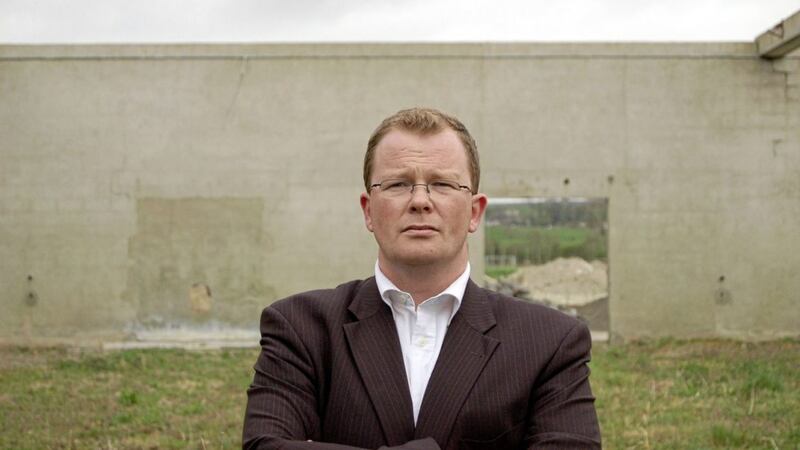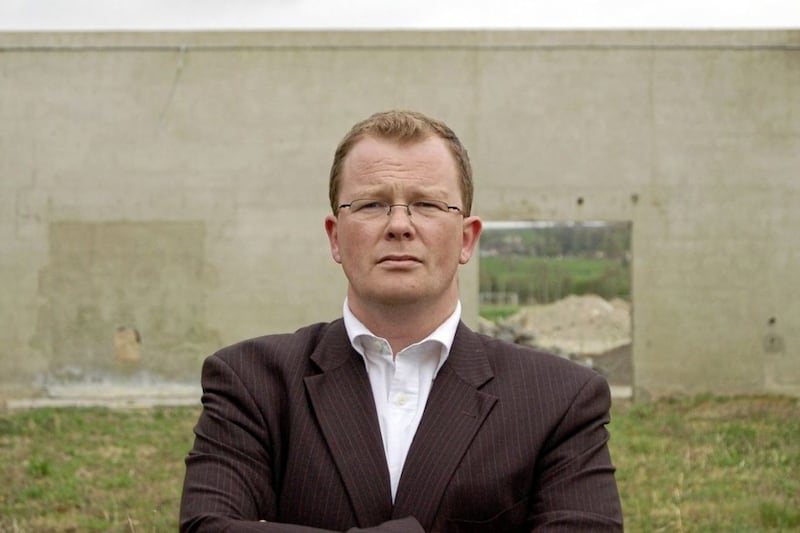"I'D NORMALLY be in the middle of a Year 11 class at the minute" admits author Brian McGilloway when we call to discuss his new novel, The Last Crossing. An English teacher long before he became known for his pair of popular crime fiction series – one centred on borderland Garda detective Benedict Devlin and the other starring PSNI public protection officer Lucy Black – McGilloway (46) teaches at Strabane's Holy Cross College, currently closed due to the ongoing coronavirus restrictions.
The Covid-19 lockdown has also put paid to the launch of the Derry native's latest book, his first for three years: standalone novel The Last Crossing centres on the belated reunion of three Irish characters involved in an execution-style murder in Scotland during the Troubles.
"Aye, it's a bit strange," says the author of being denied the usual opportunity to celebrate the arrival of his latest work at the likes of this year's Noireland International Crime Festival in Belfast, where he was due to appear last Sunday until it had to be rescheduled due to the pandemic.
"You kind of hold a launch for each book more just for yourself just to mark that it's out – because you wake up on the day of publication and the world is unchanged. Nobody really notices, unless you're JK Rowling or someone who gets queues from midnight.
"It's an interesting time, because this is the traditional period [of the year] when a lot of crime fiction tends to be published with people's summer holiday reading in mind. Liz Nugent, Steve Cavanagh, Andrea Carter and Jane Casey all have books which have just come out, so we're all in the same boat."
The father-of-four adds: "But what's happening in the world right now puts everything in perspective. As long as the family are all safe and well, a book will always find an audience at some stage. It's always there – it's not like if it's not bought on the day it comes out, that's the end of it. Even if it takes a while to find a readership, that's OK – as long as somebody reads it, I'm quite happy."
A case in point would be McGilloway's fifth novel Little Girl Lost: though the 2011 thriller was well reviewed upon publication, it wasn't until nearly two years later that the story which first introduced DS Lucy Black to readers hit the top of the book charts in the UK and made the New York Times Bestseller list in the US.
"I still have no idea how it happened or why," the author tells me of his first taste of major commercial success.
"It suddenly started to generate sales here and off the back of that I got a publisher in America – there wasn't a huge publicity push or anything for it. I was kind of lucky too because it was the time when e-books were really taking off, so that helped catapult it forward, and it was also around the time that there were a whole series of books with 'girl' or 'the girl' in their titles – Gone Girl, The Girl on The Train, The Girl With The Dragon Tattoo.
"That definitely wasn't intentional, as it was written about three years beforehand. It was actually named after a William Blake poem. In fact, Lucy Black was originally going to be Lucy Blake – until I found out there was already a fictional detective called Lucy Blake."
With a chuckle, he adds: "Little Girl Lost was also my the first book where the blurb on the back didn't mention that it was set in Northern Ireland. I sometimes wonder about that."
Opening with a memorably chilling murder scene, The Last Crossing is told from the point of view of Derry-born teacher-turned-sacristan Tony, flitting back and forth between present-day events and his memories of the 1980s. Gradually, we learn the reasons he and his two partners in crime, Hugh and Karen – the latter of whom is also Tony's great 'lost love' – came to be standing over a shallow grave in remote Scottish woodland on that fateful night.
The trio are brought together again in order to revisit the scene for the continued good of the north's new 'normality', much to the chagrin of veteran republican triggerman Hugh.
"Part of it came from the search for the Disappeared and people giving information to help try and locate victims," explains McGilloway of his inspiration for The Last Crossing, which builds masterfully towards a tense climax in a page-turning manner.
"Also, all the other books I've done have been police procedurals where the focus has been on the detective trying to work out what happened, whereas with this one what kind of interested me was that you'd know what happened from the start.
"With the procedural, you tend to focus on the consequences for the victim's family and, by extension, to the detective – but what this one is really about is the consequences of violence for the perpetrator: someone who makes that choice and then has to live with the consequences. How do they justify it to themselves?
"In the book, each of the three characters responds in a different way. And I liked the idea of the claustrophobia of the entire thing being set on a boat, and then in a car and in woodland with just a relatively small cast of characters.
"So the central story is about the ways in which people become involved in violence and the consequences of that violence for them – but then the bigger story is the cost of that violence to our society: how we have all been affected by it and the kind of compromises that everybody had to make – and that, initially, probably most people were happy to make because it meant the end of violence. But there are those who now feel a resentment, that compromise cost too much."
He adds: "I kind of wanted to have an element of almost Greek tragedy to it. So there's references to Seneca, although he was a Roman, because of that whole thing about 'blood leading to blood leading to blood'."
Spoken like a true English teacher – indeed, The Last Crossing also marks the first time McGilloway has been able to draw from experiences in his 'other' career while writing one of his central characters: Tony Canning's job as a high school English teacher plays a key role in the increasingly gripping chain of events which unfold.
"I've never had the opportunity to write a teacher before," admits the former head of English at Derry's St Columb's College.
"For reasons that become clear in the story, I wanted somebody who would be in his own way quite protective of children and aware of the consequences of family trauma on children.
"For all of the main characters, I kind of wanted them to be ordinary everyday people doing normal everyday jobs who just kind of find themselves in this extraordinary situation – and then have to deal with the consequences of it."
Next up for McGilloway will be Inspector Devlin's first outing since 2012's The Nameless Dead, with another Lucy Black book surely not far behind it. However, for fans hoping for a team-up between McGilloway's best-selling crime fighters, it might be a while yet before the pair can combine their respective skills.
"Originally, Little Girl Lost was going to end with Lucy phoning Devlin to ask for his help – but my TV agent told me that I couldn't do that because they were two separate sets of rights. So it never appeared in the book. But I did write a story [The Sacrifice] for BBC Radio 4 during the City of Culture year with the two of them were working together on a case where a body was found in Grianán.
"I really enjoyed doing that so at some stage I might put the two of them together – they certainly exist in the same universe."
:: The Last Crossing is out now, published by Dome. Order online via Noalibis.com and other retailers. Visit Brian online at Brianmcgilloway.com.








